Sabbatical in Sweden
Thursday, August 31, 2006
Sunday, August 27, 2006
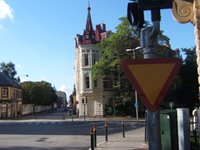 Sprinkled throughout are some bonus photographs or our apartment buiding (with the tall spire -- Cathy's art nook is the window you can see on the second floor), the herring aisle at the supermarket, and farmers selling their organic produce at the weekend market.
Sprinkled throughout are some bonus photographs or our apartment buiding (with the tall spire -- Cathy's art nook is the window you can see on the second floor), the herring aisle at the supermarket, and farmers selling their organic produce at the weekend market.Cathy and David took a look at the classes offered at the gym. There are the usual weight-lifting, aerobics, stepping and spinning (indoor biking). And then there are a large assortment of various levels of "Swedish gympa." Cathy took a gympa class to see what it was like – a bit of running and jumping to get the heartbeat going, some resistance training with bendable bars, some yoga stretches, and a relaxation. There is gympa for fit 20-somethings, and gympa for people over 55, even gympa for families and babies. Cathy also tried a "Power Yoga"class. In the class she took, about 60 people worked on mats in an air-conditioned gym lit only with candles. The teacher was hooked up to a wireless microphone and breathlessly announced each yoga pose, and then, in a sultry voice said, "Bra (good)," after each pose was finished. We'll enjoy keeping in shape in Sweden.
 It has been raining a lot in Lund. We are talking big thunderstorms with very heavy rain here. We knew we were getting quite soggy but our friends Boris and Görel told us how soggy – they had had to release water from their backyard swimming pool because it had rained about seven inches in seven days. Boris and Görel also have another unique feature in their house (in addition to the swimming pool and sauna, which we haven't seen yet). They have, or will soon have, a house heated by geothermal energy. This is a fairly common energy source in private houses in Lund. It turns out that during the winter, the groundwater under Lund is warmer than the surface temperature so surface water is piped down to the groundwater, heat is exchanged and energy is transformed through a heat pump that will soon be installed in Boris and Görel 's basement. Boris and Görel had a pipe drilled in their front yard last spring to reach this slightly warmer groundwater. It astonished us that the pipe was 201 meters long. Recently, the city of Lund tried to reach an even warmer groundwater source that the city thought might help provide energy for the entire region and ended up drilling down into the earth for 3700 meters before giving up on the project.
It has been raining a lot in Lund. We are talking big thunderstorms with very heavy rain here. We knew we were getting quite soggy but our friends Boris and Görel told us how soggy – they had had to release water from their backyard swimming pool because it had rained about seven inches in seven days. Boris and Görel also have another unique feature in their house (in addition to the swimming pool and sauna, which we haven't seen yet). They have, or will soon have, a house heated by geothermal energy. This is a fairly common energy source in private houses in Lund. It turns out that during the winter, the groundwater under Lund is warmer than the surface temperature so surface water is piped down to the groundwater, heat is exchanged and energy is transformed through a heat pump that will soon be installed in Boris and Görel 's basement. Boris and Görel had a pipe drilled in their front yard last spring to reach this slightly warmer groundwater. It astonished us that the pipe was 201 meters long. Recently, the city of Lund tried to reach an even warmer groundwater source that the city thought might help provide energy for the entire region and ended up drilling down into the earth for 3700 meters before giving up on the project.There is a Swedish election coming up in mid-September at both the local and national level. We haven't seen a lot of signs or advertising in the paper – or political junk mail, at least as far as we can tell. However, the Lund town squares really are being used like town squares and electioneering by candidates speaking in front of little kiosks is a common sight. Today Cathy noticed that people who stopped to talk to candidates at the Liberal Party booth were given a mylar balloon, the Social Democrats will give you a whistle, the Greens will give you a red rose, and communists appeared to be asking for donations. We also saw the communists out recruiting in Göteborg when we took a brief vacation there.
Akiva and David headed off in the middle of August to Malmö for a baseball practice with the “Baseball by the Bridge” group. 15 minutes by train and another 15 by bus put them at a huge complex of sports fields, including (we think) baseball, soccer, American football, Australian Rules rugby, and more. We had some extra time since we weren’t sure where we were going, so we looked for a snack. Just down the street was a golf complex – golf, a driving range, miniature golf, a café and clubhouse, etc. That fortified us for practice. There were 7-8 kids at the practice, most (but not all) of them either from the U.S. or with an American parent. The coach, Charlie, is a writer from New Hampshire who has been in Sweden for many years. Practice was very good and well organized; they were preparing for a baseball jamboree a few weeks later. Given the distance, Akiva decided not to continue practicing with them, shifting his focus to fotboll.
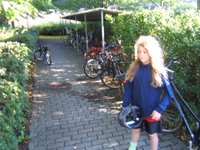 Akiva registered at the Lunds Bollklubb – LBK – in the "kids born in 1997" group, and he started soccer or fotboll practice the following Monday. We biked to the field (a wonderful achievement for Akiva, who has learned how to bike from getting his balance to good control in city traffic in less than two weeks). There were nearly 20 kids, all boys (although three of them had long hair, like Akiva, and we wondered at first if they were girls). Akiva did drills and scrimmages with the others for the full 90 minutes. The kids spoke little English (although most have taken a year of it at school), but the coach and the assistants were fluent. Once Akiva has a few weeks of school and goes to more practices, he'll likely be chattering away. His first game was supposed to be this past weekend, but it was cancelled because the field (in Hjärup, several kilometers away from Lund) was unplayable due to a flood.
Akiva registered at the Lunds Bollklubb – LBK – in the "kids born in 1997" group, and he started soccer or fotboll practice the following Monday. We biked to the field (a wonderful achievement for Akiva, who has learned how to bike from getting his balance to good control in city traffic in less than two weeks). There were nearly 20 kids, all boys (although three of them had long hair, like Akiva, and we wondered at first if they were girls). Akiva did drills and scrimmages with the others for the full 90 minutes. The kids spoke little English (although most have taken a year of it at school), but the coach and the assistants were fluent. Once Akiva has a few weeks of school and goes to more practices, he'll likely be chattering away. His first game was supposed to be this past weekend, but it was cancelled because the field (in Hjärup, several kilometers away from Lund) was unplayable due to a flood.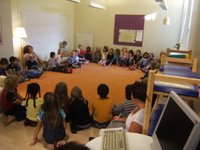 The kids started school today. We biked with Akiva to his school, the Bilingual Montessori School of Lund. There was, as is often the case at the beginning of a school year, both excitement and confusion. Akiva is in the 2nd-3rd grade class. It's largely a shoes-off school (as are homes in Sweden), but this rule was quite relaxed on the first day. In any case, parents and kids were all herded out to the playground, where the headmistress greeted everybody and introduced the staff, all in Swedish. So, English is the second language, right? Well, no. As Dave Barry used to say, we're not making this up: the school is "bilingual" in Swedish, English and French. Parents and kids were then herded to the classrooms, where the teachers laid out the structure, some rules, did some more introductions, took attendance, etc. – this was done in Swedish and almost all was translated into English. Then off to the playground for something to eat and drink, with the kids hitting the jungle gym, the sandbox, the mini-soccer field, the basketball court, and so forth. Akiva is enrolled in "fritid", which is the after-school program that is universal in Swedish schools. After school he spent two hours with his Japanese tutor, Ayumi-san, who is making sure that Akiva doesn't mix up his Japanese with his English, Swedish and French. Just wait until he starts Hebrew in preparation for his bar mitzvah.
The kids started school today. We biked with Akiva to his school, the Bilingual Montessori School of Lund. There was, as is often the case at the beginning of a school year, both excitement and confusion. Akiva is in the 2nd-3rd grade class. It's largely a shoes-off school (as are homes in Sweden), but this rule was quite relaxed on the first day. In any case, parents and kids were all herded out to the playground, where the headmistress greeted everybody and introduced the staff, all in Swedish. So, English is the second language, right? Well, no. As Dave Barry used to say, we're not making this up: the school is "bilingual" in Swedish, English and French. Parents and kids were then herded to the classrooms, where the teachers laid out the structure, some rules, did some more introductions, took attendance, etc. – this was done in Swedish and almost all was translated into English. Then off to the playground for something to eat and drink, with the kids hitting the jungle gym, the sandbox, the mini-soccer field, the basketball court, and so forth. Akiva is enrolled in "fritid", which is the after-school program that is universal in Swedish schools. After school he spent two hours with his Japanese tutor, Ayumi-san, who is making sure that Akiva doesn't mix up his Japanese with his English, Swedish and French. Just wait until he starts Hebrew in preparation for his bar mitzvah.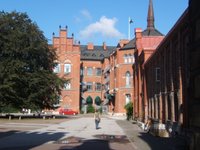 Emma had a great start to school. She's got about 30 kids in her class in the first year of the English-based pre-IB (International Bacculareate) class at Katedralskolan. She is the youngest in the class – some of the kids are 17, and most are 15-16-years old. Almost all of the kids in her class are Swedish (except one American who has lived in Sweden for many years), but all have passed an English competency test so that they can take it pre-IB classes. We are a little concerned about how much English the kids know, however. On the first day of school, Emma and a new friend asked a few of their classmates if they were registered for Italian class. It must have been Emma's accent, but all of the kids they asked about the Italian class looked at their watches and told them what time it was. Emma will take Swedish classes and also is taking the Italian class – taught in Swedish. But she is not sure what time the class is.
Emma had a great start to school. She's got about 30 kids in her class in the first year of the English-based pre-IB (International Bacculareate) class at Katedralskolan. She is the youngest in the class – some of the kids are 17, and most are 15-16-years old. Almost all of the kids in her class are Swedish (except one American who has lived in Sweden for many years), but all have passed an English competency test so that they can take it pre-IB classes. We are a little concerned about how much English the kids know, however. On the first day of school, Emma and a new friend asked a few of their classmates if they were registered for Italian class. It must have been Emma's accent, but all of the kids they asked about the Italian class looked at their watches and told them what time it was. Emma will take Swedish classes and also is taking the Italian class – taught in Swedish. But she is not sure what time the class is. Sending a letter or a postcard from Sweden to the U.S. costs 10 kroner (about $1.40). But don't move to Denmark in the hope that we'll send you more postal mail – it costs the same to send mail to Denmark as it does to send mail to America! So keep posted here and we will tell you all we would have written in that 10 kroner letter.
Sending a letter or a postcard from Sweden to the U.S. costs 10 kroner (about $1.40). But don't move to Denmark in the hope that we'll send you more postal mail – it costs the same to send mail to Denmark as it does to send mail to America! So keep posted here and we will tell you all we would have written in that 10 kroner letter.Take a peek at the following, which we found on the net, describing how you know you've been in Sweden too long. If you don't find them entertaining, you haven't lived in Sweden! Can you imagine someone winning the Nobel Prize but declining to go the ceremony because it's during the time they scheduled to do laundry?
Monday, August 14, 2006
Our friends very kindly lent us their car over the weekend. We needed a few things for the apartment – some end tables, a mirror for Emma, a bathroom mat, some utensils for the kitchen, and even clothes hangers! So we decided to go to nearby Malmö – the third largest city in
kitchen, and even clothes hangers! So we decided to go to nearby Malmö – the third largest city in
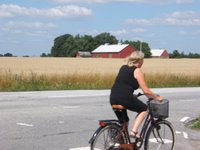 The next day we took advantage of the car once again to go to the beach. We drove about seven miles to a small town just south of Bjarred (where we had briefly considered living). It’s amazing how quickly you get from
The next day we took advantage of the car once again to go to the beach. We drove about seven miles to a small town just south of Bjarred (where we had briefly considered living). It’s amazing how quickly you get from  and slogs back in. (Apparently in Bjarred there is a long pier that allows you to walk out on and jump into deeper water.) There were a few sailboats out, and views of Malmö and the Oresund bridge that we took from the
and slogs back in. (Apparently in Bjarred there is a long pier that allows you to walk out on and jump into deeper water.) There were a few sailboats out, and views of Malmö and the Oresund bridge that we took from the
Everyone in Lund speaks English, at least everyone we’ve met, with most of them speaking it better than your average American (and certainly better than the boob at the top). The clerks in the supermarkets, the baristas in the coffee shops, the man in the game store, the people in the bike stores, and even the drunks in the park who told us (based on watching Akiva play catch) that he would be excellent at handball, and we should take him to Lugie’s in Lund. OK, we’ve found a few people who don’t speak much English – another drunk (in the park, where drunks are found the world over), one cashier in a mall, and a fellow in the library who tried to speak to us in several languages (including Swedish and German) before giving up. But for sure everyone speaks more English than we speak Swedish!
One item we tried to get at IKEA that we thought would be universally used throughout
One impulse item we got at IKEA was a ping pong set with a net, two paddles and three balls. The net fits across our dining room table, and with our huge room with high ceilings, we can play killer games, as long as we compensate for the oval table. It's great except when someone is eating at the table! Our current family champion is Akiva, and the game is a hit with visitors too.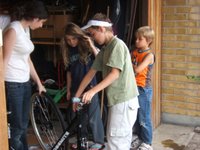 When we returned our friend’s car – after driving to IKEA and the beach – we of course wanted to return it with a full tank of gas. The tank was about half empty and cost about $75 to fill. There is a good reason people bike in
When we returned our friend’s car – after driving to IKEA and the beach – we of course wanted to return it with a full tank of gas. The tank was about half empty and cost about $75 to fill. There is a good reason people bike in
Hey, we finally got our cell (mobile) phones! It turns out that the problem wasn’t registration of our personnummers, but rather with our lack of a credit history in
Next week  apartment is basically located on campus, we are interested in how this will affect the traffic and the noise from passers-by late at night. We’ve heard one of the biggest problems is speeding hordes of bicycle riders since all of the students ride and ride quickly. We’ve all been practicing our bike riding skills this week to prepare for the onslaught. Another potential problem is from hazing the freshman class – the older students like to play practical jokes that may get rather wild, especially when the jokes are played by various “nation” houses – fraternity-style houses associated with each region of
apartment is basically located on campus, we are interested in how this will affect the traffic and the noise from passers-by late at night. We’ve heard one of the biggest problems is speeding hordes of bicycle riders since all of the students ride and ride quickly. We’ve all been practicing our bike riding skills this week to prepare for the onslaught. Another potential problem is from hazing the freshman class – the older students like to play practical jokes that may get rather wild, especially when the jokes are played by various “nation” houses – fraternity-style houses associated with each region of
 We haven’t seen very many atypical people around. Most folks we’ve seen are relatively conservative in dress and movement. We haven’t spotted any weird piercings or hair colors. We did see one slightly eccentric young man on a bicycle with an orange top hat and tux and one transvestite -- but school hasn’t started back yet. We shall see what 40,000 people under age 25 bring to
We haven’t seen very many atypical people around. Most folks we’ve seen are relatively conservative in dress and movement. We haven’t spotted any weird piercings or hair colors. We did see one slightly eccentric young man on a bicycle with an orange top hat and tux and one transvestite -- but school hasn’t started back yet. We shall see what 40,000 people under age 25 bring to
How do you tell a Norwegian pirate? He’s the one with two eye patches. Thanks to Björn, that was our introduction to the jokes that Swedes tell about Norwegians! Now who tells jokes about Swedes? We’ll let you know.
Tuesday, August 08, 2006
Friday, August 04, 2006
 As many of you know, the Nottles (a mythical creature that is part-Notkin and part-Tuttle) have written about their previous extended travels outside of the
As many of you know, the Nottles (a mythical creature that is part-Notkin and part-Tuttle) have written about their previous extended travels outside of the In the months preceding our sabbatical, we took a handful of Swedish lessons from our friend Ylva. We focused more on culture than language – Ylva is an anthropologist. Ylva told us the three specific virtues in
Since Cathy is often late, she asked how to call ahead and say, “I will be late,” and how to say, when arriving, “I am sorry I am late.” Ylva was horrified and said, “You just can’t say that,” and her hand shook as she wrote down “I will be late” in Swedish. It turns out since
Ylva also taught us that the Swedish word for “gullible” translates as “blue-eyed.” We still wonder if Ylva was telling the truth, or taking advantage of the gullible Nottle clan.
While we were waiting to move from 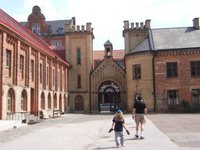 eate) program, taught in English. She’ll be taking beginning Italian, and she chose drama over music and art. We’ve visited the school grounds, and Cathy and David think the buildings and courtyard look just like Hogwarts. We haven’t chosen Akiva’s school yet. From what we understand, he can go to an English-speaking school, Swedish schools that specialize in nature or in arts, a Swedish as a second language school, or a Montessori school that has classes in Swedish, English, and French. We’ll talk to principals next week when they get back from vacation.
eate) program, taught in English. She’ll be taking beginning Italian, and she chose drama over music and art. We’ve visited the school grounds, and Cathy and David think the buildings and courtyard look just like Hogwarts. We haven’t chosen Akiva’s school yet. From what we understand, he can go to an English-speaking school, Swedish schools that specialize in nature or in arts, a Swedish as a second language school, or a Montessori school that has classes in Swedish, English, and French. We’ll talk to principals next week when they get back from vacation.
A huge challenge turned out to be getting our visas, which we needed because we’ll be here for a year with kids in school. The forms weren’t especially complicated, and David sent them off in early June. The forms and our passports went to the Swedish Consulate in NYC. At the consulate they checked the forms to make sure that they were filled in properly, and they were. Then the forms were transferred, electronically, to the Swedish Migration Board, in
The trip itself was very easy. Emma was amused when it took Cathy and David a long time to make a call from the Copenhagen airport to Sweden – we had to find out that one dials “00” to make an international call between Denmark and nearby Sweden. Emma wondered, “How many parents does it take to make a phone call?” “Only two,” she decided, “but it takes them a loooooong time.”
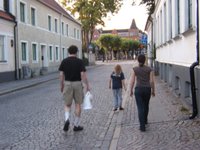 When we left the airport for the taxi ranks outside the airport, we had to choose between one queue for a Danish taxi to
When we left the airport for the taxi ranks outside the airport, we had to choose between one queue for a Danish taxi to
Our friend Boris met us at our apartment. He had picked up the keys from our landlord (they are acquaintances). We’re in a building nicknamed the “iron building” because of its distinctive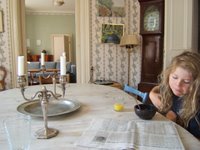 shape. We’re on the second floor of the building, right at the point of the iron. The apartment is lovely and indeed bigger than expected. The ceilings are more than 3 meters high, and there is a ladder for changing light bulbs, getting into high storage areas, etc. But we still could use a bedroom for Akiva. We only have two bedrooms, so we’re trying to figure out how to carve a space for him from the giant living and dining room areas. Maybe he can sleep under the Steinway baby grand piano.
shape. We’re on the second floor of the building, right at the point of the iron. The apartment is lovely and indeed bigger than expected. The ceilings are more than 3 meters high, and there is a ladder for changing light bulbs, getting into high storage areas, etc. But we still could use a bedroom for Akiva. We only have two bedrooms, so we’re trying to figure out how to carve a space for him from the giant living and dining room areas. Maybe he can sleep under the Steinway baby grand piano.
We’re 200 meters from the country’s best hospital (called a “sick house” in Swedish), and we’re directly across the street from a vegetarian restaurant run by (primarily Polish) Hare Krishnas. We’re on the main street in
Emma thought that
Our University hosts and long-time friends, Boris and Görel invited us for dinner at their house the night of our arrival. They have two boys, Måns and Björn – Måns is about two years younger than Emma, and Björn is about two years younger than Akiva. All three boys have birthdays in early October, when they’ll be 12, 9, and 7. Måns has taken English in school for three years, and he is quite good although not yet comfortable with it. But, as always happens, the kids figured out how to communicate. The four kids played a lot of soccer in the yard while we parents sat around reminiscing. The kids all took a swim in their pool before dessert, too. The boys showed us their rooms, Cathy started a stuffed animal fight, and then we headed back to the apartment to stay awake listening to the cathedral chimes early into the morning. (The next day Cathy was playing hide-and-seek in our apartment with Akiva. A few minutes after Cathy hid, Akiva and Emma came to David laughing hysterically, because Cathy said she needed help getting out of her hiding place -- on top of our refrigerator!)
 Cathy spends a great deal of time in front of the nearby public library next to a statue of Carl Linnaeus. (The picture on the left is captioned, "Linnaeus has a hotspot for Cathy.") The statue of this most famous son of
Cathy spends a great deal of time in front of the nearby public library next to a statue of Carl Linnaeus. (The picture on the left is captioned, "Linnaeus has a hotspot for Cathy.") The statue of this most famous son of
So how does one acquire a personnummer? First, find the tax authority office. Then, fill out a simple form and provide passports and visas. Then walk home and get the childrens’ birth certificates and bring them back to the tax authority. Then wait three days and the personnummer comes in the mail. Of course the personnummer needs to be registered with the central authority before the mobile phone company will issue a phone number. So we are still waiting for a phone. Don’t call us and we won’t call you (or send you email).
Our next adventure is tomorrow morning. We do our laundry. It turns out, according to Ylva and to Boris, doing the laundry is a topic of great interest in
